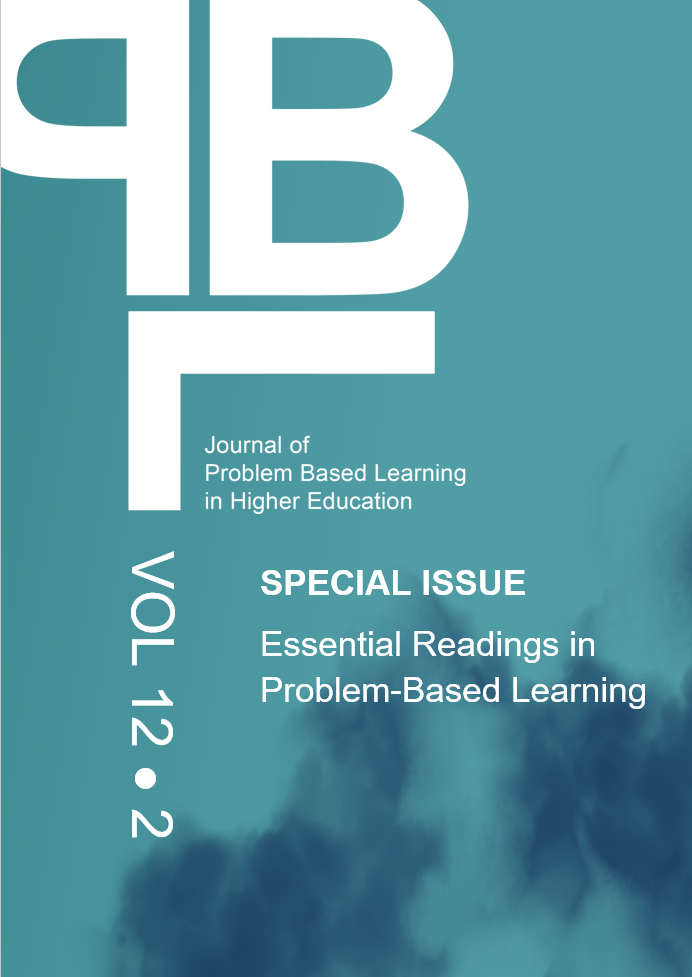Abstract
This paper advocates for the adoption of Nexus Analysis as a robust analytical framework in Problem-Based Learning (PBL) research. Developed by Scollon and Scollon, Nexus Analysis offers a unique lens for examining the intricate dynamics of PBL by seamlessly integrating micro-level interactions with macro-level societal discourses. The approach enables researchers to capture the rich, nuanced interplay between individual behaviors and broader educational contexts. Despite its potential, Nexus Analysis remains underutilized in the study of PBL, where research often polarizes towards either micro or macro perspectives without bridging the two. This paper discusses the foundational concepts of Nexus Analysis, illustrating its relevance and applicability in capturing the complex reality of educational environments. By highlighting its methodological strengths, the paper aims to encourage scholars to adopt Nexus Analysis, to further strengthen the research around PBL.
References
Barrows, H. S., & Tamblyn, R. M. (1980). Problem-Based Learning: An approach to medical education. Springer.
Bridges, S. M., & Imafuku, R. (Eds.). (2020). Interactional Research Into Problem-Based Learning. Purdue University Press. https://doi.org/10.2307/j.ctvs1g9g4
Fairclough, N. (2011). Critical discourse analysis: The critical study of language (2. ed., [Nachdr.]). Routledge.
Foucault, M., Faubion, J. D., & Foucault, M. (2000). Power. New Press.
Graham, R. (2017). Snapshot review of engineering education reform in Chile [Snapshot Review]. Aalborg Centre for Problem Based Learning in Engineering and Sustainability under the aupices of UNESCO.
Hendry, G., Wiggins, S., & Anderson, T. (2016). Are You Still with Us? Managing Mobile Phone Use and Group Interaction in PBL. Interdisciplinary Journal of Problem-Based Learning, 10(2). https://doi.org/10.7771/1541-5015.1600
Hung, W., Dolmans, D. H. J. M., & van Merriënboer, J. J. G. (2019). A review to identify key perspectives in PBL meta-analyses and reviews: Trends, gaps and future research directions. Advances in Health Sciences Education, 24(5), 943–957. https://doi.org/10.1007/s10459-019-09945-x
Illeris, K. (1974). Problemorientering og deltagerstyring. Unge Pædagoger.
Kek, M. Y. C. A., & Huijser, H. (2017). Problem-based Learning into the Future. https://doi.org/10.1007/978-981-10-2454-2
McQuade, R., Ventura-Medina, E., Wiggins, S., & Anderson, T. (2019). Examining self-managed problem-based learning interactions in engineering education. European Journal of Engineering Education, 45(2), 232-248. https://doi.org/10.1080/03043797.2019.1649366
Moallem, M., Hung, W., & Dabbagh, N. (Eds.). (2019). The Wiley Handbook of Problem-Based Learning. John Wiley & Sons. https://doi.org/10.1002/9781119173243
O’Grady, G., Yew, E. H. J., Goh, K. P. L., & Schmidt, H. G. (Eds.). (2012). One-Day, One-Problem. Springer Singapore. https://doi.org/10.1007/978-981-4021-75-3
Scollon, R. (2001). Mediated discourse: The nexus of practice (1. publ). Routledge. https://doi.org/10.4324/9780203420065
Scollon, R., Scollon, S. B. K., & Jones, R. H. (2012). Intercultural communication: A discourse approach (3., [rev.] ed). Wiley-Blackwell.
Scollon, R., & Scollon, S. W. (2004). Nexus Analysis—Discourse and the Emerging Internet. Routledge. https://doi.org/10.4324/9780203694343
Servant, V. F. C. (2016). Revolutions and re-iterations: An intellectual history of problem-based learning. Erasmus University Rotterdam.
Servant-Miklos, V. F. C. (2019). Fifty Years on: A Retrospective on the World’s First Problem-based Learning Programme at McMaster University Medical School. Health Professions Education, 5(1), 3–12. https://doi.org/10.1016/j.hpe.2018.04.002
Sørensen, K. A. (2023). What is the educational purpose of problem-oriented project-based learning?: Reading the discursive construction of the educational aims and purposes of problem-oriented project-based learning in textual introductions from 1974-2018. Department of People and Technology, Roskilde University.
Thorndahl, K. L. (2023). No more neat fugues. Aalborg University.
Velmurugan, G. (2022). Problem Construction in Problem-Based Learning How Students Deal with Disagreements in Decision-Making. Aalborg University.
Velmurugan, G., & Davidsen, J. G. (2024). Negotiating Epistemic Experience vs. Epistemic Expertise in PBL Supervision. Journal of Problem-Based Learning in Higher Education, 12(1). https://doi.org/10.54337/ojs.jpblhe.v12i1.8284
Velmurugan, G., & Friedrichsen, D. (2023). Competence Profile to improve Employability. 51st Annual Conference of the European Society for Engineering Education Proceedings, 3003–3013. https://doi.org/10.21427/YD0B-H510
Velmurugan, G., Stentoft, D., & Davidsen, J. (2021). Disagreeing about the Problem in PBL: How students negotiate disagreements regarding the Problem in PBL. Journal of Problem-Based Learning in Higher Education, 9(1), 42–62. https://doi.org/10.5278/ojs.jpblhe.v9i1.6241

This work is licensed under a Creative Commons Attribution 4.0 International License.
Copyright (c) 2024 Giajenthiran Velmurugan
